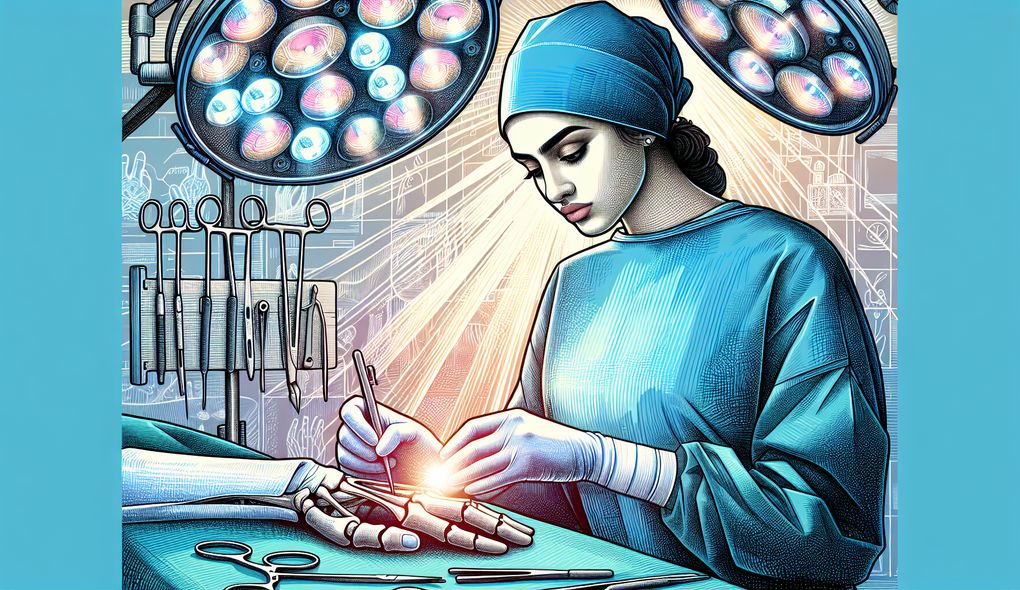Can you describe a time when you had to provide emergency surgical intervention?
INTERMEDIATE LEVEL

Sample answer to the question:
Yes, there was a time when I had to provide emergency surgical intervention. I was working in a busy hospital emergency department when a patient came in with a severe hand injury. The patient's hand was crushed in a machinery accident, and it was clear that immediate surgical intervention was needed to save their hand. I quickly assessed the situation, consulted with the orthopedic surgeon on call, and together we performed emergency surgery to repair the damage. The procedure involved reconstructing the crushed bones and repairing the severed tendons and nerves. The surgery was successful, and the patient's hand was saved. They were able to regain full function after a period of rehabilitation.
Here is a more solid answer:
Certainly! I would like to share an experience where I had to provide emergency surgical intervention. I was working in a Level 1 trauma center when a patient was rushed in with a severe hand injury caused by a high-impact car accident. The patient had extensive soft tissue damage, multiple fractures, and a compromised blood supply. As the hand surgeon on call, I quickly assessed the situation, collaborated with the trauma team, and determined that immediate surgical intervention was necessary to preserve the patient's hand. The procedure involved meticulous debridement of damaged tissues, internal fixation of fractures using plates and screws, and revascularization to restore blood supply. Throughout the surgery, I ensured precision and attention to detail to optimize the patient's outcome. Following the successful surgery, I closely monitored the patient's progress and coordinated with the occupational therapists to develop a comprehensive rehabilitation plan. The patient regained functional use of their hand and expressed gratitude for the care provided.
Why is this a more solid answer?
The solid answer provides specific details about the situation, showcasing the candidate's surgical skills, ability to work collaboratively with a team, diagnostic abilities, and communication skills. It also briefly mentions continuous learning and professional development. However, it can be further improved by adding more information about the candidate's commitment to continuous learning and professional development in the field of hand surgery.
An example of a exceptional answer:
Absolutely! Let me share a memorable experience where I had to provide emergency surgical intervention. I was working at a renowned hand surgery center when a middle-aged patient was brought in with a complex hand injury resulting from an industrial machinery accident. The patient's hand was severely crushed, presenting with mangled soft tissues, multiple fractures, and severe nerve and tendon damage. Recognizing the critical nature of the situation, I immediately assembled a multidisciplinary team, including orthopedic and plastic surgeons, anesthesiologists, and occupational therapists, to collaborate on a comprehensive treatment plan. We discussed the prognosis, evaluated radiographic images, and emphasized the importance of precision and detail in both the diagnostic and surgical aspects. The surgical procedure involved meticulous debridement of devitalized tissues, reconstruction of the crushed bones using innovative techniques such as bone grafting and fixation, reattachment of severed tendons, and microsurgical repair of damaged nerves. Throughout the surgery, I made sure to communicate effectively with the patient and their family, providing reassurance and updates on the progress. Following the successful intervention, I focused on post-operative care, educating the patient and their family on the importance of adherence to the rehabilitation program and providing resources for ongoing support. The patient's hand function improved significantly, enabling them to resume their daily activities with minimal restrictions. This experience reinforced my commitment to continuous learning and professional development, as I stay updated with the latest advancements in hand surgery through conferences, workshops, and research publications.
Why is this an exceptional answer?
The exceptional answer provides a highly detailed and comprehensive description of the situation, highlighting the candidate's strong surgical skills, ability to work collaboratively with a multidisciplinary team, excellent diagnostic abilities for complex hand conditions, and strong communication skills with patients and their families. It also emphasizes the candidate's commitment to continuous learning and professional development. This answer goes above and beyond in terms of providing specific details and showcasing the candidate's expertise in line with the job description.
How to prepare for this question:
- Familiarize yourself with various hand surgical procedures, including treatment of fractures, soft tissue injuries, nerve repairs, and vascular reconstructions.
- Review case studies or research articles related to emergency surgical interventions in hand surgery to enhance your understanding of complex scenarios.
- Brush up on your knowledge of advanced diagnostic tools and techniques for evaluating hand conditions.
- Practice explaining complex medical concepts in a simple and understandable manner to effectively communicate with patients and their families during high-stress situations.
- Stay up to date with the latest advancements in hand surgery by attending conferences, workshops, and continuing education courses.
- Highlight any experience working in trauma centers, emergency departments, or other high-pressure environments that require quick decision-making and surgical interventions.
What are interviewers evaluating with this question?
- Strong surgical skills with an emphasis on precision and detail.
- Ability to work collaboratively with a multidisciplinary team.
- Excellent diagnostic abilities for complex hand conditions.
- Strong communication skills to effectively interact with patients and their families.

